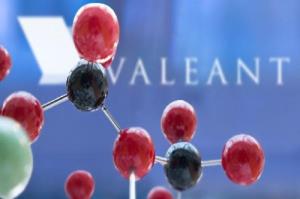Valeant: Generic Syprine Is Here

Source: thestreet.com
Teva (TEVA) recently announced the U.S. launch of Valeant's (VRX) Syprine which treats Wilson's Disease:
Teva Pharmaceutical Industries Ltd. (TEVJF), (NYSE and TASE: TEVA) today announced the launch of generic version of Syprine®1 (trientine hydrochloride) capsules, 250 mg, in the U.S.
Trientine hydrochloride is used in the treatment of patients with Wilson’s disease who are intolerant of penicillamine.
Wilson’s disease is a genetic disease that prevents the body from removing extra copper. The body needs a small amount of copper from food to stay healthy, but over time, high copper levels can cause life-threatening organ damage. Wilson’s disease is a rare disorder that affects approximately 1 in 30,000 individuals.2
Teva has the largest portfolio of FDA-approved generic drugs; it needs to continue to launch new drugs to replace the loss of exclusivity (LOE) for Copaxone, its blockbuster multiple sclerosis treatment. Meanwhile, Valeant has been cutting costs and divesting assets to prove to investors it can service its $27 billion debt load from new and existing products.
The Situation
In 2015 Valeant was one of several companies Hillary Clinton pointed out for price-gouging. In December 2017 the Senate Special Committee on Aging issued a 130 page report that gave recommendations on how to combat price gouging. It specifically mentioned Valeant and its pricing for Syprine. Syprine and Cuprimine are both used to treat Wilson's disease. Valeant acquired both drugs in 2010 as part of its $318 million acquisition of Aton.
After the company became the sole source for the treatment of Wilson's disease Valeant implemented major price increases for both drugs:
Management then developed the Organ Drug Pricing Plan, which included price increases for Syprine and Cuprimine of 400% and 100%, respectively. According to a chart provided by the Committee, from 2010 to July 2015 Valeant increased the price of Syprine by over 3,100% and the price of Cuprimine by over 5,700%.
Since then Senate Special Committee report the FDA has been made a concerted effort to streamline the approval process for general drugs. That said, the launch of generic Syprine could have a meaningful impact on Valeant's EBITDA. The company's Q3 2017 revenue was off 10% Y/Y. The decline was driven by Branded Rx (ex-Salix) and U.S. Diversified which were off 45% and 29%, respectively. They represent 29% of Valeant's total revenue and several of their products face LOE.
Q3 revenue from Syprine was $18 million, and the drug is included in the U.S. Diversified segment. Since Cuprimine ($20 million in revenue) also treats Wilson's disease I believe it could also be at risk from generic Syprine. Cuprimine and Syprine generated $38 million in combined Q3 revenue - this represents 11% of U.S. Diversified revenue and 1.7% of Valeant's total revenue. The rub is that U.S. Diversified's EBITDA margins are 75% versus 42% for the entire company. If 58% of Cuprimine and Syprine's combined revenue goes away (assumes 30% price reduction and 40% loss of market share), it could cut Valeant's EBITDA by nearly 2%. This estimate could also be optimistic given the out-sized price increases already implemented for Cuprimine and Syprine.
LOE Versus New Drug Launches
Valeant's Apriso (ulcerative colitis) and Uceris tablets (mild to moderate ulcerative colitis) also face loss of exclusivity (LOE). With a combined $79 million in revenue they represent about 4% of Valeant's total revenue and an estimated 5% of EBITDA (assumes 59% EBITDA margins). Given their revenue size, a hit to Apriso or Uceris tablets could hurt sentiment for the Valeant. When it comes to VRX it is all about sentiment. The stock can be volatile based on news of new drug launches, LOE or debt pare downs.
Management has tried to convince the market that Valeant has the R&D prowess to grow the top line through new drug launches. That remains to be seen. Siliq (psoriasis) and Vyzulta (glaucoma), are both expected to be launched this year. The psoriasis market is currently overcrowded and highly competitive. I doubt Siliq will be that successful even if Valeant under-prices the product vis-a-vis competitors. Vyzulta appears to be very promising; the question remains, "Will Vyzulta and other new products offset LOE?" I will only believe it when I see it.
What is not debatable is that Valeant had done a yeoman's job in reducing its debt load. From Q1 2016 to Q3 2017 the company reduced debt by approximately $6 billion. It also announced divestitures of nearly $4 billion since the beginning of 2016; such divestitures have also allowed the company to cut expensive R&D products which has inured to the bottom line. VRX bulls have been ecstatic over the company's survival prospects. That said, I believe the company is at an inflection point. Valeant has to forgo earnings from divested assets to pare debt and window dress the balance sheet. If revenue from new products cannot exceed LOE then top line growth could suffer and its credit metrics could deteriorate.



